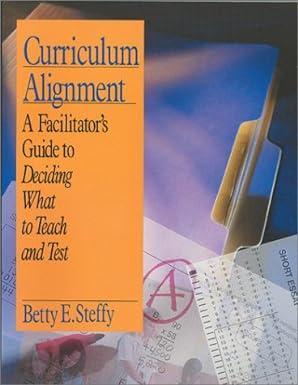Answered step by step
Verified Expert Solution
Question
1 Approved Answer
I updated the pics Done Attachment Week Transaction 1 Received $3000 as contribution to the corporation Purchased Ventor Ave $260 Purchased Short Line Railroad (RR)
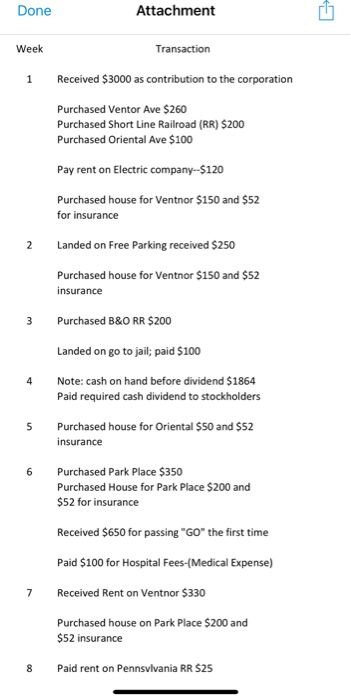
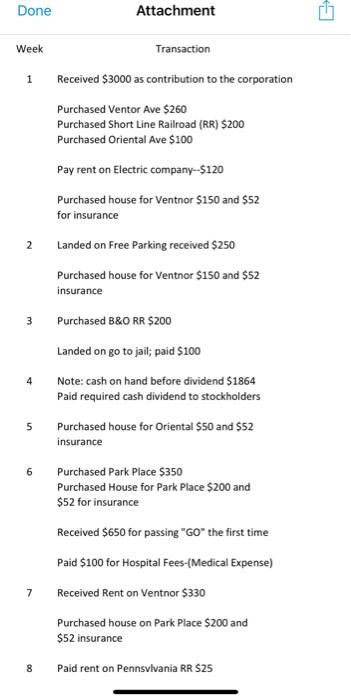
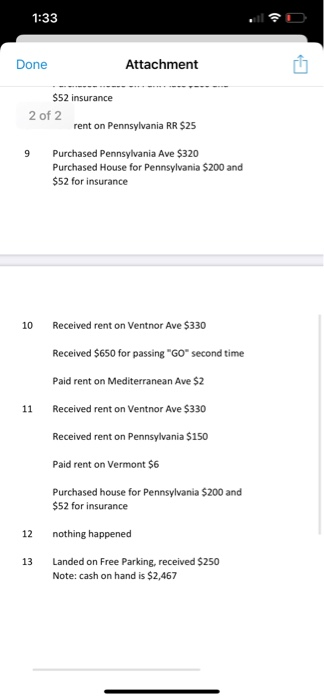
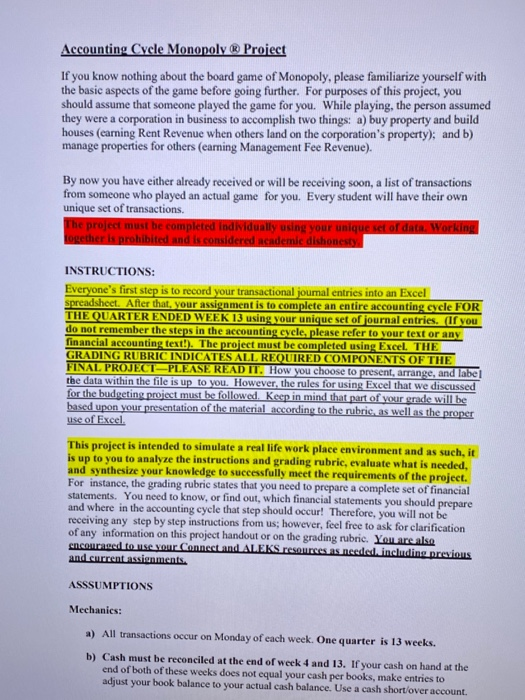
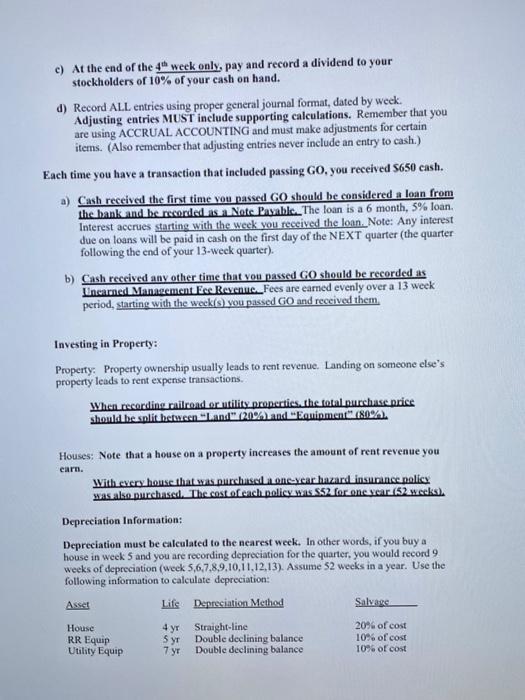
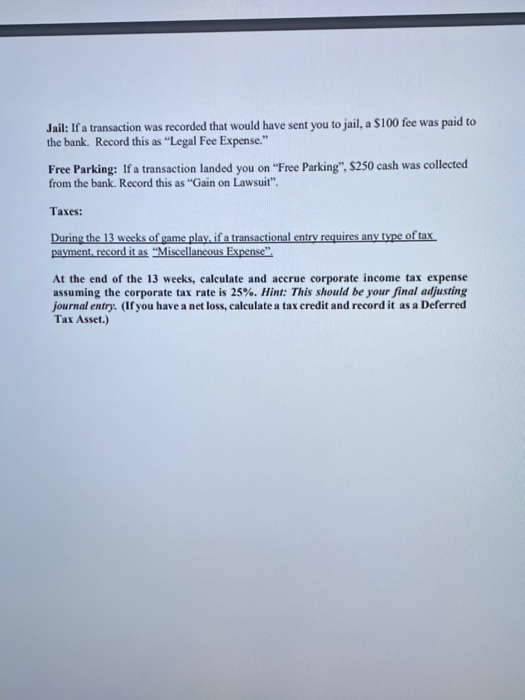
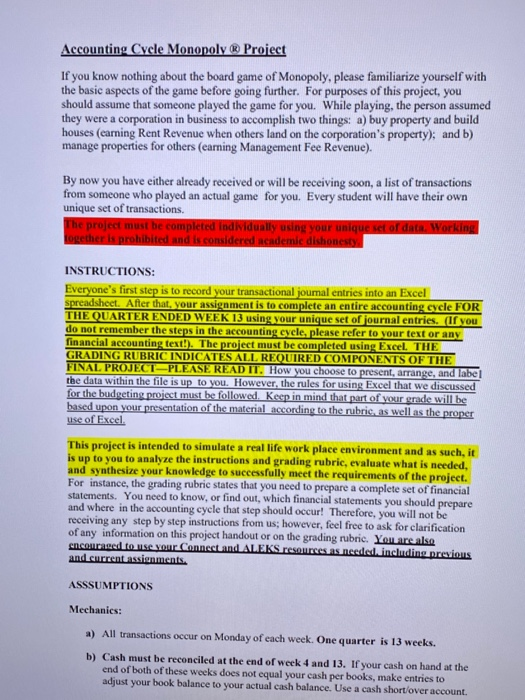
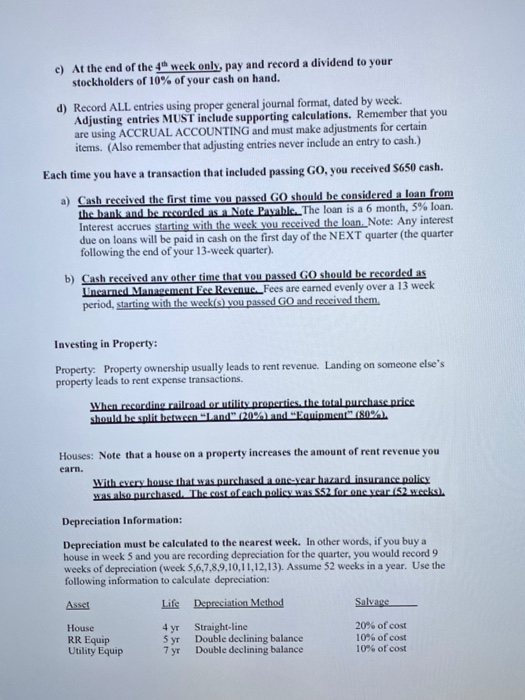
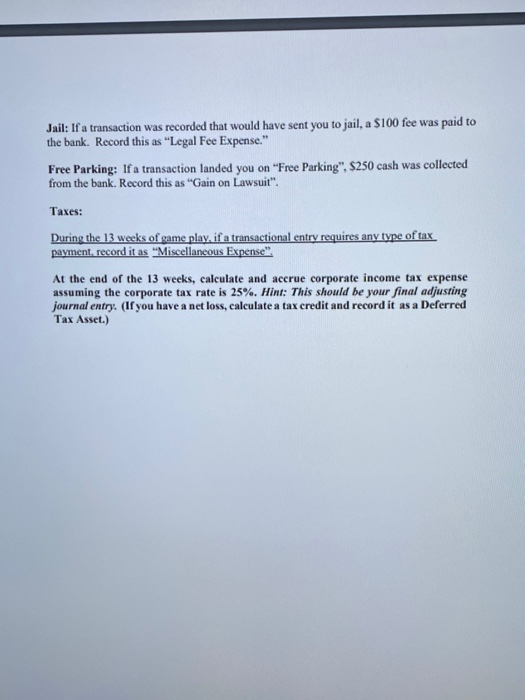
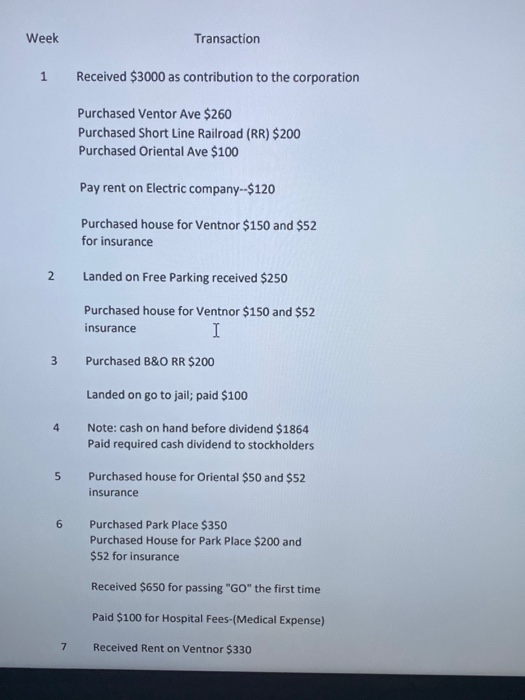
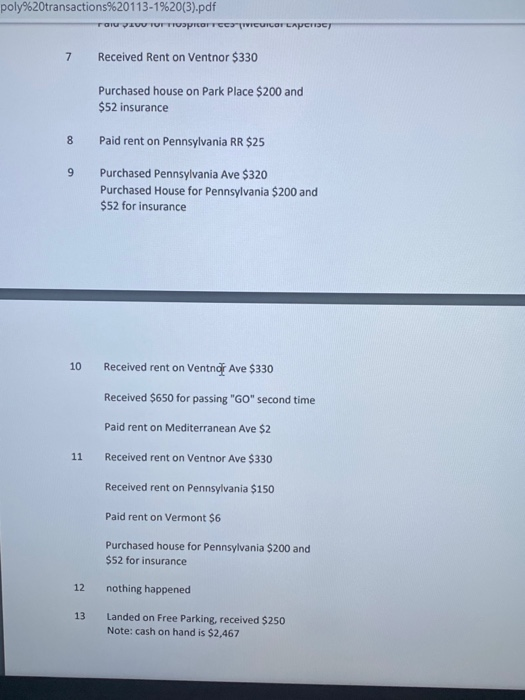
I updated the pics
Done Attachment Week Transaction 1 Received $3000 as contribution to the corporation Purchased Ventor Ave $260 Purchased Short Line Railroad (RR) $200 Purchased Oriental Ave $100 Pay rent on Electric company--$120 2 Purchased house for Ventnor $150 and $52 for insurance Landed on Free Parking received $250 Purchased house for Ventnor $150 and $52 insurance 3 Purchased B&O RR $200 Landed on go to jail; paid $100 4 Note: cash on hand before dividend $1864 Paid required cash dividend to stockholders Purchased house for Oriental $50 and $52 insurance 5 6 Purchased Park Place $350 Purchased House for Park Place $200 and $52 for insurance Received $650 for passing "GO" the first time Paid $100 for Hospital Fees-(Medical Expense) 7 Received Rent on Ventnor $330 Purchased house on Park Place $200 and $52 insurance 8 Paid rent on Pennsylvania RR $25 Done Attachment Week Transaction 1 Received $3000 as contribution to the corporation Purchased Ventor Ave $260 Purchased Short Line Railroad (RR) $200 Purchased Oriental Ave $100 Pay rent on Electric company--$120 2 Purchased house for Ventnor $150 and $52 for insurance Landed on Free Parking received $250 Purchased house for Ventnor $150 and $52 insurance 3 Purchased B&O RR $200 Landed on go to jail; paid $100 4 Note: cash on hand before dividend $1864 Paid required cash dividend to stockholders Purchased house for Oriental $50 and $52 insurance 5 6 Purchased Park Place $350 Purchased House for Park Place $200 and $52 for insurance Received $650 for passing "GO" the first time Paid $100 for Hospital Fees-(Medical Expense) 7 Received Rent on Ventnor $330 Purchased house on Park Place $200 and $52 insurance 8 Paid rent on Pennsylvania RR $25 1:33 Done Attachment $52 insurance 2 of 2 rent on Pennsylvania RR $25 Purchased Pennsylvania Ave $320 Purchased House for Pennsylvania $200 and $52 for insurance 9 10 11 Received rent on Ventnor Ave $330 Received $650 for passing "GO" second time Paid rent on Mediterranean Ave $2 Received rent on Ventnor Ave $330 Received rent on Pennsylvania $150 Paid rent on Vermont $6 Purchased house for Pennsylvania $200 and $52 for insurance 12 nothing happened Landed on Free Parking, received $250 Note: cash on hand is $2,467 13 Accounting Cycle Monopoly Project If you know nothing about the board game of Monopoly, please familiarize yourself with the basic aspects of the game before going further. For purposes of this project, you should assume that someone played the game for you. While playing, the person assumed they were a corporation in business to accomplish two things: a) buy property and build houses (earning Rent Revenue when others land on the corporation's property); and b) manage properties for others (earning Management Fee Revenue). By now you have either already received or will be receiving soon, a list of transactions from someone who played an actual game for you. Every student will have their own unique set of transactions The project must be completed individually using your unique set of data. Working together is prohibited and is considered academic dishonesty INSTRUCTIONS: Everyone's first step is to record your transactional joumal entries into an Excel spreadsheet. After that, your assignment is to complete an entire accounting cycle FOR THE QUARTER ENDED WEEK 13 using your unique set of journal entries. If you do not remember the steps in the accounting cycle, please refer to your text or any financial accounting text!). The project must be completed using Excel. THE GRADING RUBRIC INDICATES ALL REQUIRED COMPONENTS OF THE FINAL PROJECT--PLEASE READ IT. How you choose to present, arrange, and label the data within the file is up to you. However, the rules for using Excel that we discussed for the budgeting project must be followed. Keep in mind that part of your grade will be based upon your presentation of the material according to the rubric, as well as the proper use of Excel This project is intended to simulate a real life work place environment and as such, it is up to you to analyze the instructions and grading rubric, evaluate what is needed, and synthesize your knowledge to successfully meet the requirements of the project. For instance, the grading rubric states that you need to prepare a complete set of financial statements. You need to know, or find out, which financial statements you should prepare and where in the accounting cycle that step should occur! Therefore, you will not be receiving any step by step instructions from us; however, feel free to ask for clarification of any information on this project handout or on the grading rubric. You are also encouraged to use your Connect and ALEKS resources as needed, including previous and current assignments. ASSSUMPTIONS Mechanics: a) All transactions occur on Monday of each week. One quarter is 13 weeks. b) Cash must be reconciled at the end of week 4 and 13. If your cash on hand at the end of both of these weeks does not equal your cash per books, make entries to adjust your book balance to your actual cash balance. Use a cash shortlover account. c) At the end of the 4 week only, pay and record a dividend to your stockholders of 10% of your cash on hand. d) Record ALL entries using proper general journal format, dated by week. Adjusting entries MUST include supporting calculations. Remember that you are using ACCRUAL ACCOUNTING and must make adjustments for certain items. (Also remember that adjusting entries never include an entry to cash.) Each time you have a transaction that included passing Go, you received $650 cash. a) Cash received the first time you passed GO should be considered a loan from the bank and be recorded as a Note Payable. The loan is a 6 month, 5% loan. Interest accrues starting with the week you received the loan. Note: Any interest due on loans will be paid in cash on the first day of the NEXT quarter (the quarter following the end of your 13-week quarter). b) Cash received any other time that you passed GO should be recorded as Unearned Management Fee Revenue Fees are earned evenly over a 13 week period, starting with the week(s) vou passed GO and received them. Investing in Property: Property. Property ownership usually leads to rent revenue. Landing on someone else's property leads to rent expense transactions When recording railroad or utility properties, the total purchase price should be split between "Land" (20%) and Equipment" (80%). Houses: Note that a house on a property increases the amount of rent revenue you carn. With every house that was purchased a one-year hazard Insurance policy was also purchased. The cost of each policy was $52 for one year 152 weeks). Depreciation Information: Depreciation must be calculated to the nearest week. In other words, if you buy a house in week 5 and you are recording depreciation for the quarter, you would record 9 weeks of depreciation (week 5,6,7,8,9,10,11,12,13). Assume 52 weeks in a year. Use the following information to calculate depreciation: Assst Life Depreciation Method Salvage House 4 Straight-line 20% of cost RR Equip 5 Double declining balance 10% of cost Utility Equip 7 yr Double declining balance 10% of cost Jail: If a transaction was recorded that would have sent you to jail, a $100 fee was paid to the bank. Record this as "Legal Fee Expense." Free Parking: Ifa transaction landed you on "Free Parking", $250 cash was collected from the bank. Record this as "Gain on Lawsuit". Taxes: During the 13 weeks of game play, if a transactional entry requires any type of tax payment, record it as "Miscellaneous Expense" At the end of the 13 weeks, calculate and accrue corporate income tax expense assuming the corporate tax rate is 25%. Hint: This should be your final adjusting journal entry. (If you have a net loss, calculate a tax credit and record it as a Deferred Tax Asset.) Accounting Cycle Monopoly Project If you know nothing about the board game of Monopoly, please familiarize yourself with the basic aspects of the game before going further. For purposes of this project, you should assume that someone played the game for you. While playing, the person assumed they were a corporation in business to accomplish two things: a) buy property and build houses (earning Rent Revenue when others land on the corporation's property); and b) manage properties for others (earning Management Fee Revenue). By now you have either already received or will be receiving soon, a list of transactions from someone who played an actual game for you. Every student will have their own unique set of transactions The project must be completed individually using your unique set of data. Working together is prohibited and is considered academic dishonesty INSTRUCTIONS: Everyone's first step is to record your transactional joumal entries into an Excel spreadsheet. After that, your assignment is to complete an entire accounting cycle FOR THE QUARTER ENDED WEEK 13 using your unique set of journal entries. If you do not remember the steps in the accounting cycle, please refer to your text or any financial accounting text!). The project must be completed using Excel. THE GRADING RUBRIC INDICATES ALL REQUIRED COMPONENTS OF THE FINAL PROJECT--PLEASE READ IT. How you choose to present, arrange, and label the data within the file is up to you. However, the rules for using Excel that we discussed for the budgeting project must be followed. Keep in mind that part of your grade will be based upon your presentation of the material according to the rubric, as well as the proper use of Excel This project is intended to simulate a real life work place environment and as such, it is up to you to analyze the instructions and grading rubric, evaluate what is needed, and synthesize your knowledge to successfully meet the requirements of the project. For instance, the grading rubric states that you need to prepare a complete set of financial statements. You need to know, or find out, which financial statements you should prepare and where in the accounting cycle that step should occur! Therefore, you will not be receiving any step by step instructions from us; however, feel free to ask for clarification of any information on this project handout or on the grading rubric. You are also encouraged to use your Connect and ALEKS resources as needed, including previous and current assignments. ASSSUMPTIONS Mechanics: a) All transactions occur on Monday of each week. One quarter is 13 weeks. b) Cash must be reconciled at the end of week 4 and 13. If your cash on hand at the end of both of these weeks does not equal your cash per books, make entries to adjust your book balance to your actual cash balance. Use a cash shortlover account. c) At the end of the 4 week only, pay and record a dividend to your stockholders of 10% of your cash on hand. d) Record ALL entries using proper general journal format, dated by week. Adjusting entries MUST include supporting calculations. Remember that you are using ACCRUAL ACCOUNTING and must make adjustments for certain items. (Also remember that adjusting entries never include an entry to cash.) Each time you have a transaction that included passing Go, you received $650 cash. a) Cash received the first time you passed GO should be considered a loan from the bank and be recorded as a Note Payable. The loan is a 6 month, 5% loan. Interest accrues starting with the week you received the loan. Note: Any interest due on loans will be paid in cash on the first day of the NEXT quarter (the quarter following the end of your 13-week quarter). b) Cash received any other time that you passed GO should be recorded as Unearned Management Fee Revenue Fees are earned evenly over a 13 week period, starting with the week(s) vou passed GO and received them. Investing in Property: Property. Property ownership usually leads to rent revenue. Landing on someone else's property leads to rent expense transactions When recording railroad or utility properties, the total purchase price should be split between "Land" (20%) and Equipment" (80%). Houses: Note that a house on a property increases the amount of rent revenue you carn. With every house that was purchased a one-year hazard Insurance policy was also purchased. The cost of each policy was $52 for one year 152 weeks). Depreciation Information: Depreciation must be calculated to the nearest week. In other words, if you buy a house in week 5 and you are recording depreciation for the quarter, you would record 9 weeks of depreciation (week 5,6,7,8,9,10,11,12,13). Assume 52 weeks in a year. Use the following information to calculate depreciation: Assst Life Depreciation Method Salvage House 4 Straight-line 20% of cost RR Equip 5 Double declining balance 10% of cost Utility Equip 7 yr Double declining balance 10% of cost Jail: If a transaction was recorded that would have sent you to jail, a $100 fee was paid to the bank. Record this as "Legal Fee Expense." Free Parking: Ifa transaction landed you on "Free Parking", $250 cash was collected from the bank. Record this as "Gain on Lawsuit". Taxes: During the 13 weeks of game play, if a transactional entry requires any type of tax payment, record it as "Miscellaneous Expense" At the end of the 13 weeks, calculate and accrue corporate income tax expense assuming the corporate tax rate is 25%. Hint: This should be your final adjusting journal entry. (If you have a net loss, calculate a tax credit and record it as a Deferred Tax Asset.) poly%20transactions%20113-1%20(3).pdf 7 Received Rent on Ventnor $330 Purchased house on Park Place $200 and $52 insurance 8 Paid rent on Pennsylvania RR $25 9 Purchased Pennsylvania Ave $320 Purchased House for Pennsylvania $200 and $52 for insurance 10 Received rent on Ventnor Ave $330 Received $650 for passing "GO" second time Paid rent on Mediterranean Ave $2 11 Received rent on Ventnor Ave $330 Received rent on Pennsylvania $150 Paid rent on Vermont $6 Purchased house for Pennsylvania $200 and $52 for insurance 12 nothing happened 13 Landed on Free Parking, received $250 Note: cash on hand is $2,467 Done Attachment Week Transaction 1 Received $3000 as contribution to the corporation Purchased Ventor Ave $260 Purchased Short Line Railroad (RR) $200 Purchased Oriental Ave $100 Pay rent on Electric company--$120 2 Purchased house for Ventnor $150 and $52 for insurance Landed on Free Parking received $250 Purchased house for Ventnor $150 and $52 insurance 3 Purchased B&O RR $200 Landed on go to jail; paid $100 4 Note: cash on hand before dividend $1864 Paid required cash dividend to stockholders Purchased house for Oriental $50 and $52 insurance 5 6 Purchased Park Place $350 Purchased House for Park Place $200 and $52 for insurance Received $650 for passing "GO" the first time Paid $100 for Hospital Fees-(Medical Expense) 7 Received Rent on Ventnor $330 Purchased house on Park Place $200 and $52 insurance 8 Paid rent on Pennsylvania RR $25 Done Attachment Week Transaction 1 Received $3000 as contribution to the corporation Purchased Ventor Ave $260 Purchased Short Line Railroad (RR) $200 Purchased Oriental Ave $100 Pay rent on Electric company--$120 2 Purchased house for Ventnor $150 and $52 for insurance Landed on Free Parking received $250 Purchased house for Ventnor $150 and $52 insurance 3 Purchased B&O RR $200 Landed on go to jail; paid $100 4 Note: cash on hand before dividend $1864 Paid required cash dividend to stockholders Purchased house for Oriental $50 and $52 insurance 5 6 Purchased Park Place $350 Purchased House for Park Place $200 and $52 for insurance Received $650 for passing "GO" the first time Paid $100 for Hospital Fees-(Medical Expense) 7 Received Rent on Ventnor $330 Purchased house on Park Place $200 and $52 insurance 8 Paid rent on Pennsylvania RR $25 1:33 Done Attachment $52 insurance 2 of 2 rent on Pennsylvania RR $25 Purchased Pennsylvania Ave $320 Purchased House for Pennsylvania $200 and $52 for insurance 9 10 11 Received rent on Ventnor Ave $330 Received $650 for passing "GO" second time Paid rent on Mediterranean Ave $2 Received rent on Ventnor Ave $330 Received rent on Pennsylvania $150 Paid rent on Vermont $6 Purchased house for Pennsylvania $200 and $52 for insurance 12 nothing happened Landed on Free Parking, received $250 Note: cash on hand is $2,467 13 Accounting Cycle Monopoly Project If you know nothing about the board game of Monopoly, please familiarize yourself with the basic aspects of the game before going further. For purposes of this project, you should assume that someone played the game for you. While playing, the person assumed they were a corporation in business to accomplish two things: a) buy property and build houses (earning Rent Revenue when others land on the corporation's property); and b) manage properties for others (earning Management Fee Revenue). By now you have either already received or will be receiving soon, a list of transactions from someone who played an actual game for you. Every student will have their own unique set of transactions The project must be completed individually using your unique set of data. Working together is prohibited and is considered academic dishonesty INSTRUCTIONS: Everyone's first step is to record your transactional joumal entries into an Excel spreadsheet. After that, your assignment is to complete an entire accounting cycle FOR THE QUARTER ENDED WEEK 13 using your unique set of journal entries. If you do not remember the steps in the accounting cycle, please refer to your text or any financial accounting text!). The project must be completed using Excel. THE GRADING RUBRIC INDICATES ALL REQUIRED COMPONENTS OF THE FINAL PROJECT--PLEASE READ IT. How you choose to present, arrange, and label the data within the file is up to you. However, the rules for using Excel that we discussed for the budgeting project must be followed. Keep in mind that part of your grade will be based upon your presentation of the material according to the rubric, as well as the proper use of Excel This project is intended to simulate a real life work place environment and as such, it is up to you to analyze the instructions and grading rubric, evaluate what is needed, and synthesize your knowledge to successfully meet the requirements of the project. For instance, the grading rubric states that you need to prepare a complete set of financial statements. You need to know, or find out, which financial statements you should prepare and where in the accounting cycle that step should occur! Therefore, you will not be receiving any step by step instructions from us; however, feel free to ask for clarification of any information on this project handout or on the grading rubric. You are also encouraged to use your Connect and ALEKS resources as needed, including previous and current assignments. ASSSUMPTIONS Mechanics: a) All transactions occur on Monday of each week. One quarter is 13 weeks. b) Cash must be reconciled at the end of week 4 and 13. If your cash on hand at the end of both of these weeks does not equal your cash per books, make entries to adjust your book balance to your actual cash balance. Use a cash shortlover account. c) At the end of the 4 week only, pay and record a dividend to your stockholders of 10% of your cash on hand. d) Record ALL entries using proper general journal format, dated by week. Adjusting entries MUST include supporting calculations. Remember that you are using ACCRUAL ACCOUNTING and must make adjustments for certain items. (Also remember that adjusting entries never include an entry to cash.) Each time you have a transaction that included passing Go, you received $650 cash. a) Cash received the first time you passed GO should be considered a loan from the bank and be recorded as a Note Payable. The loan is a 6 month, 5% loan. Interest accrues starting with the week you received the loan. Note: Any interest due on loans will be paid in cash on the first day of the NEXT quarter (the quarter following the end of your 13-week quarter). b) Cash received any other time that you passed GO should be recorded as Unearned Management Fee Revenue Fees are earned evenly over a 13 week period, starting with the week(s) vou passed GO and received them. Investing in Property: Property. Property ownership usually leads to rent revenue. Landing on someone else's property leads to rent expense transactions When recording railroad or utility properties, the total purchase price should be split between "Land" (20%) and Equipment" (80%). Houses: Note that a house on a property increases the amount of rent revenue you carn. With every house that was purchased a one-year hazard Insurance policy was also purchased. The cost of each policy was $52 for one year 152 weeks). Depreciation Information: Depreciation must be calculated to the nearest week. In other words, if you buy a house in week 5 and you are recording depreciation for the quarter, you would record 9 weeks of depreciation (week 5,6,7,8,9,10,11,12,13). Assume 52 weeks in a year. Use the following information to calculate depreciation: Assst Life Depreciation Method Salvage House 4 Straight-line 20% of cost RR Equip 5 Double declining balance 10% of cost Utility Equip 7 yr Double declining balance 10% of cost Jail: If a transaction was recorded that would have sent you to jail, a $100 fee was paid to the bank. Record this as "Legal Fee Expense." Free Parking: Ifa transaction landed you on "Free Parking", $250 cash was collected from the bank. Record this as "Gain on Lawsuit". Taxes: During the 13 weeks of game play, if a transactional entry requires any type of tax payment, record it as "Miscellaneous Expense" At the end of the 13 weeks, calculate and accrue corporate income tax expense assuming the corporate tax rate is 25%. Hint: This should be your final adjusting journal entry. (If you have a net loss, calculate a tax credit and record it as a Deferred Tax Asset.) Accounting Cycle Monopoly Project If you know nothing about the board game of Monopoly, please familiarize yourself with the basic aspects of the game before going further. For purposes of this project, you should assume that someone played the game for you. While playing, the person assumed they were a corporation in business to accomplish two things: a) buy property and build houses (earning Rent Revenue when others land on the corporation's property); and b) manage properties for others (earning Management Fee Revenue). By now you have either already received or will be receiving soon, a list of transactions from someone who played an actual game for you. Every student will have their own unique set of transactions The project must be completed individually using your unique set of data. Working together is prohibited and is considered academic dishonesty INSTRUCTIONS: Everyone's first step is to record your transactional joumal entries into an Excel spreadsheet. After that, your assignment is to complete an entire accounting cycle FOR THE QUARTER ENDED WEEK 13 using your unique set of journal entries. If you do not remember the steps in the accounting cycle, please refer to your text or any financial accounting text!). The project must be completed using Excel. THE GRADING RUBRIC INDICATES ALL REQUIRED COMPONENTS OF THE FINAL PROJECT--PLEASE READ IT. How you choose to present, arrange, and label the data within the file is up to you. However, the rules for using Excel that we discussed for the budgeting project must be followed. Keep in mind that part of your grade will be based upon your presentation of the material according to the rubric, as well as the proper use of Excel This project is intended to simulate a real life work place environment and as such, it is up to you to analyze the instructions and grading rubric, evaluate what is needed, and synthesize your knowledge to successfully meet the requirements of the project. For instance, the grading rubric states that you need to prepare a complete set of financial statements. You need to know, or find out, which financial statements you should prepare and where in the accounting cycle that step should occur! Therefore, you will not be receiving any step by step instructions from us; however, feel free to ask for clarification of any information on this project handout or on the grading rubric. You are also encouraged to use your Connect and ALEKS resources as needed, including previous and current assignments. ASSSUMPTIONS Mechanics: a) All transactions occur on Monday of each week. One quarter is 13 weeks. b) Cash must be reconciled at the end of week 4 and 13. If your cash on hand at the end of both of these weeks does not equal your cash per books, make entries to adjust your book balance to your actual cash balance. Use a cash shortlover account. c) At the end of the 4 week only, pay and record a dividend to your stockholders of 10% of your cash on hand. d) Record ALL entries using proper general journal format, dated by week. Adjusting entries MUST include supporting calculations. Remember that you are using ACCRUAL ACCOUNTING and must make adjustments for certain items. (Also remember that adjusting entries never include an entry to cash.) Each time you have a transaction that included passing Go, you received $650 cash. a) Cash received the first time you passed GO should be considered a loan from the bank and be recorded as a Note Payable. The loan is a 6 month, 5% loan. Interest accrues starting with the week you received the loan. Note: Any interest due on loans will be paid in cash on the first day of the NEXT quarter (the quarter following the end of your 13-week quarter). b) Cash received any other time that you passed GO should be recorded as Unearned Management Fee Revenue Fees are earned evenly over a 13 week period, starting with the week(s) vou passed GO and received them. Investing in Property: Property. Property ownership usually leads to rent revenue. Landing on someone else's property leads to rent expense transactions When recording railroad or utility properties, the total purchase price should be split between "Land" (20%) and Equipment" (80%). Houses: Note that a house on a property increases the amount of rent revenue you carn. With every house that was purchased a one-year hazard Insurance policy was also purchased. The cost of each policy was $52 for one year 152 weeks). Depreciation Information: Depreciation must be calculated to the nearest week. In other words, if you buy a house in week 5 and you are recording depreciation for the quarter, you would record 9 weeks of depreciation (week 5,6,7,8,9,10,11,12,13). Assume 52 weeks in a year. Use the following information to calculate depreciation: Assst Life Depreciation Method Salvage House 4 Straight-line 20% of cost RR Equip 5 Double declining balance 10% of cost Utility Equip 7 yr Double declining balance 10% of cost Jail: If a transaction was recorded that would have sent you to jail, a $100 fee was paid to the bank. Record this as "Legal Fee Expense." Free Parking: Ifa transaction landed you on "Free Parking", $250 cash was collected from the bank. Record this as "Gain on Lawsuit". Taxes: During the 13 weeks of game play, if a transactional entry requires any type of tax payment, record it as "Miscellaneous Expense" At the end of the 13 weeks, calculate and accrue corporate income tax expense assuming the corporate tax rate is 25%. Hint: This should be your final adjusting journal entry. (If you have a net loss, calculate a tax credit and record it as a Deferred Tax Asset.) poly%20transactions%20113-1%20(3).pdf 7 Received Rent on Ventnor $330 Purchased house on Park Place $200 and $52 insurance 8 Paid rent on Pennsylvania RR $25 9 Purchased Pennsylvania Ave $320 Purchased House for Pennsylvania $200 and $52 for insurance 10 Received rent on Ventnor Ave $330 Received $650 for passing "GO" second time Paid rent on Mediterranean Ave $2 11 Received rent on Ventnor Ave $330 Received rent on Pennsylvania $150 Paid rent on Vermont $6 Purchased house for Pennsylvania $200 and $52 for insurance 12 nothing happened 13 Landed on Free Parking, received $250 Note: cash on hand is $2,467 Step by Step Solution
There are 3 Steps involved in it
Step: 1

Get Instant Access to Expert-Tailored Solutions
See step-by-step solutions with expert insights and AI powered tools for academic success
Step: 2

Step: 3

Ace Your Homework with AI
Get the answers you need in no time with our AI-driven, step-by-step assistance
Get Started


